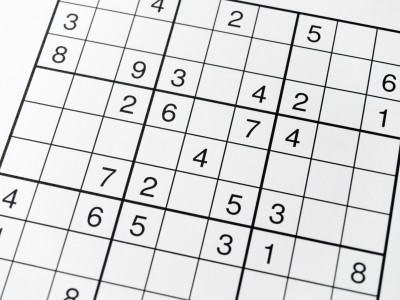Recently, one of my pastimes has brought to mind a question: What is to be gained mentally and artistically by having time limits? Does rushing to the finish line make us stronger, more efficient, or most importantly, wiser?
Stress Replaces Zen
I have always enjoyed puzzles, and for many years I have been a devotee of Sudoku, a two-dimensional numeric grid with a simple set of rules: Every 3×3 block must contain all 9 numbers, as must every row and column. Despite the simple rules, there are many logical thought processes necessary to solve the grid. When I first did these, they were on paper. Family members would buy me books of them as gifts, and I would happily work on them.
The trouble began when I found a free app for my phone to do these. Sounds great: endless new puzzles, portable, and no trees had to give their lives for the paper. The problem? The timer. It not only kept track of how long it took me to solve the puzzles, but it logged my “top ten” quickest wins. Suddenly what was a relaxing mental workout became a panicky struggle against time.
The Race
Here are the changes that took place when I started competing against the clock:
- I started using the speed of my playing to evaluate my mental alertness: if I went slowly or got stuck, I began to feel stupid and foggy. How well I could search the grid or notice patterns was constantly being evaluated.
- If I exceeded one of my top ten times while doing a puzzle, the feeling of failure would come over me. It became about “winning” or beating an opponent (even if it was some previous “me.”)
- Upon getting stuck (usually a sign that there is something subtle to notice) the urge would be to clear the game and start again, in hopes of an easier starting point. In other words, when encountering resistance, give up and start over.
- Even when the game was proceeding well, the only time it really felt good was when starting with a fresh grid; the half-finished games felt stale, like something worn-out.
Does Anybody Really Know What Time it Is?
Precision time-keeping wasn’t particularly important in people’s lives until relatively recently; accurate clocks became necessary for navigation at sea, and for railroad schedules. Before this, most people operated on the sun and moon’s motions. Of course, there were always foot races and other sports, but how quickly something was accomplished was arguably not as important, despite the substantially shorter life-spans of the past.
- Sometimes works of art took years to complete. Did anyone think less of the artist because of this?
- Patience was valued as a virtue, and was considered a mark of maturity.
- We observed the natural cycles of the world and the skies, and understood that there is a “season” for things.
- Artists and craftsmen put the emphasis on detail and meaning, rather than speed and success.
Take Your Time
When the time pressure is removed from us in our work (and play) our priorities and perceptions change. From an artistic standpoint, these are very important.
- The results, and the meaning of the activity come to the forefront. We are not winning or losing.
- The artificial feeling of failure is removed from the situation. We are not working “against” anything.
- The desire for a constant “fresh start” is removed; this only matters if time is kept. When resistance is encountered, we slow down accordingly.
- Old things, used things, previously discarded ideas and work become opportunities, rather than sources of shame.
- Small details and subtleties not previously “worth our time” are now quietly waiting for our attention.
- Peace is restored.
- How has being in a hurry influenced your work and work habits?
- What would you do if you had all the time in the world?
- Have you abandoned lines of thought because they would be too time-consuming?
- How has “beating the clock” caused stress in your life?
